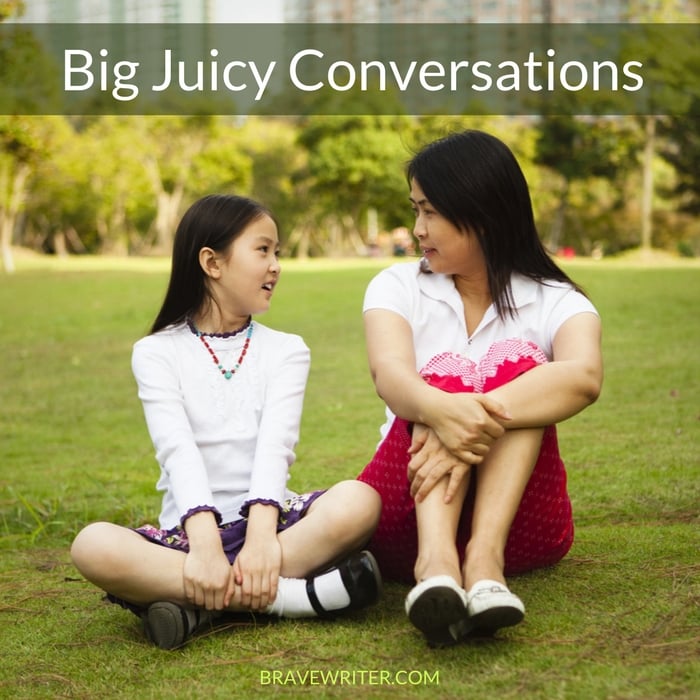The Key to Academic Achievement: Talking with Your Kids

The key to academic achievement, to education, to scholastic growth is: talking with your kids. (And it’s FREE!)
The majority of your children’s education comes via talking—not just any old talking—a specific kind of talking.
These conversations look like:
- focused attention,
- intent listening,
- an exchange lasting more than “Hey, get your shoes, we’re leaving in five minutes.”
Because we marshal so much activity for so many little ones, it’s easy to reduce contact with children to “parenting by command” as opposed to “relating to our children as people.” We issue orders and look over their heads (literally!) to the next item on the agenda.
The joy of conversation is lost in the expediency of moment-by-moment demands: jumping in the car, clearing the breakfast dishes, locating the math book, changing a load of laundry, and answering a text message. We might even start down the road of a real conversation, only to be interrupted in our minds by a sudden urgent thought related to the child in front of us:
“Yes, I do think the Beast seems verbally abusive… wait! Remind me. Did we reschedule your violin lesson? I just remembered we are going to see the dentist on Tuesday and…”
The commitment to staying present and focused on a rambling discussion about a movie or Minecraft or musings on the meaning of life by a 9 year old can easily be sidetracked when an urgent task pops to mind. It’s so difficult to resist the temptation to skip ahead to an urgent matter, rather than drilling down to the slow meandering of conversation.
We expect workbooks, explicit teaching, or reading will accomplish all we want in our children’s lives. Yet even the reading of books benefits from what I call a “big juicy conversation.” When we read in isolation from conversation, good things happen. When we read and discuss, even better things happen! Now we’re hearing the same story refracted through someone else’s experience, which expands how we understand the same story or information!
You may not be able to read every book all five of your children read (I mean, who could?!), but you can certainly contribute to the conversation about the book by
- asking questions,
- showing curiosity,
- making comparisons to books you’ve read,
- and allowing your child to bounce thoughts and ideas off of you (not that stale narration task of regurgitating information, but the true joy of sharing).
Conversation is an exchange of energy (not just an exchange of words). Conversation brings two or more people together to explore their ideas in community—to benefit from a wider set of insights and experiences than can be had alone.
Why is this important? In a homeschool, we do not naturally facilitate the kind of classroom learning that attempts to engage a variety of perspectives from a variety of students. The temptation in home education is to drive for independence where a student learns “by herself” or where the books are doing all the teaching.
Yet that independence comes at a price—no one to talk to!
What you can do, instead, is to give your kids both an audience and a sounding board. You can involve them in conversation with you, and you get to count that as having accomplished something important that day. Talking with you about their ideas, questions, thoughts, and insights IS the number one way your children get a valuable education. You are such a light of learning! Trust it! Be it! Live it! Value it!
- Make a note on your calendar each time you get to spend more than 2 minutes talking with one of your kids. Pay attention to who is getting missed (who never surfaces for a big juicy conversation) and then intentionally seek opportunities to connect with the child falling through the cracks.
- Permit yourself to waste time talking at length when the energy moves in that direction.
- Set aside the books or the movie or the math pages in favor of an extended discussion about the merits of a sitcom or why every animal poops.
These are (truly) golden moments in your children’s education.
Over time, what you will discover is that your family has curated a kind of educational culture in your home. Some of you will have created natural writers. Others will be great at mechanical exploits. Still others will be naturally inclined to work with numbers or computers. As your family talks, so your areas of expertise surface and your children learn as if by osmosis through conversations—both those they overhear and the ones in which they participate.
Go forth and waste time talking! It’s the best part of your homeschool already.

















